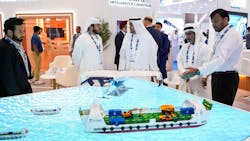Decarbonizing offshore: ADIPEC 2025 to spotlight strategies for a low-carbon future
ADIPEC highlights will include:
- How AI-driven solutions are transforming offshore operations by enhancing exploration accuracy, predictive maintenance and renewable energy performance;
- Decarbonization efforts focusing on enhancing energy system efficiency, expanding CCS projects and increasing investments in offshore wind, solar and green hydrogen technologies;
- Cross-border collaboration through extensive exhibitor participation, country pavilions and strategic conferences, enabling offshore firms to forge new partnerships and secure investments; and
- Workforce development initiatives and leadership conferences to attract, upskill and retain talent vital for the sector's digital and sustainable transformation.
By Ariana Hurtado, Editor-in-Chief
This year's ADIPEC conference and exhibition is taking place in just a few weeks in Abu Dhabi, UAE. It will host presenters and exhibitors from the largest and smallest national and international oil and energy companies, including but not limited to ADNOC, bp, Chevron, CNPC, EGAS, Eni, ExxonMobil, Inpex, Mubadala Energy, Oil India Ltd., OMV, ONGC, Oxy, Pertamina, Petrobras, Petronas, PTTEP, Shell, TotalEnergies and Wintershall Dea.
Christopher Hudson, president of dmg events (organizer of the event), chatted with Offshore about the plans and strategies to be presented and discussed among energy industry leaders and experts at the show from Nov. 3-6.
Offshore: What is the overarching goal of ADIPEC 2025? How does this year’s theme—“Energy. Intelligence. Impact.”—translate into actionable outcomes for offshore energy professionals?
Hudson: The theme reflects a simple but powerful truth: meeting the world’s growing need for secure, affordable and sustainable energy will depend on how intelligently we harness every resource to deliver meaningful results for economies and communities alike.
At its core, the theme recognizes that intelligence—both human and artificial—is transforming the way energy is produced, managed and consumed. From AI-driven optimization and digital integration to advances in hydrogen, LNG and decarbonization, intelligent innovation is reshaping the global energy landscape. ADIPEC serves as the meeting point for these forces, where ideas translate into action and impact can be measured in investment, policy and progress.
This focus is particularly relevant to the offshore energy sector, where resilience and intelligence are so critical to safe and efficient operations in the remote and extreme environmental conditions in which offshore platforms operate.
In response to these challenges and opportunities, ADIPEC convenes the wider energy sector—including offshore operators, equipment suppliers and digital innovators—under one roof to strengthen resilience in the global energy system.
Offshore: How is ADIPEC advancing real-world deployment of AI in offshore operations? With an increase in AI-related technical papers, what practical innovations should engineers and CTOs look out for?
Hudson: The rise of artificial intelligence (AI) is reshaping both global energy demand and the industry’s ability to respond. Data centers already consume around 1.5% of global electricity, and with AI workloads, that demand could more than double by 2030, rising from 415 TWh to 945 TWh. At the same time, the World Economic Forum has estimated that AI can improve energy efficiency by up to 60% in certain applications, while the IEA says that AI-optimized energy systems can increase production efficiency by up to 20%.
The complex trade-off between AI’s energy demand and energy production/savings, presents the energy sector with a unique opportunity to accelerate the shift toward cleaner energy sources while improving energy system productivity, which is particularly relevant for the offshore sector, which relies so strongly on automated monitoring and maintenance systems.
To give you an idea of how and where the sector is looking to apply AI, 20% of paper submissions for ADIPEC’s Technical Conference this year were in the category of AI and digital technology. Within that category, the future of AI and digital transformation, the Internet of Things, digital twins, and production enhancement, were the main subthemes.
Digging further into AI in the context of the offshore energy sector, we can see many examples in the market of how AI is already being deployed to build resilience and scale intelligent solutions. AI is enabling improved offshore oil and gas exploration by enhancing the accuracy of seismic data analysis, optimizing drilling, and providing predictive maintenance that reduces the downtime and expenditure of offshore equipment use.
For the offshore wind sector, AI is being leveraged to predict wind patterns, improve turbine performance and reduce downtime due to bad weather. Offshore solar also benefits from AI’s ability to smartly maintain systems, reduce downtime, prevent faults and enable optimized performance. And all four forms of offshore energy—oil, gas, wind and solar—can leverage the power of digital twinning to simulate system performance, enabling remote diagnostics and scaling.
Offshore: What are the key decarbonization strategies being discussed? How will ADIPEC address emissions reduction in offshore drilling, production and logistics?
Hudson: There are three main ways the global energy sector can continue to advance decarbonization while also meeting unprecedented energy demand:
- Enhancing energy system efficiency;
- Utilizing carbon capture and sequestration (CCS); and
- Increasing production of lower carbon energies like LNG, green hydrogen, and, of course, solar and wind.
In the context of the offshore sector, AI has the potential to significantly improve the energy efficiency of all types of energy capture systems by enabling smarter, data-driven decision-making and automation, and reducing losses through smarter remote monitoring. AI is also supporting the smart integration of intermittent clean energy sources, like solar and wind, to the electricity grid.
While there has been a resurgence of interest in oil and gas globally, investment in renewable energy projects is also continuing. We are seeing offshore wind scale through deepwater and floating technologies while floating solar is carving out a niche in land-constrained and water-abundant regions—both contributing meaningfully to decarbonization and energy diversification.
This year, CCS also entered a critical growth phase with major investments, new technologies and global collaboration driving its expansion, potentially reducing the emissions impact of the carbon-intensive fuels that must continue to play a role in meeting global energy demand. The Global CCS Institute notes that there are now 628 CCS projects in the global pipeline, which marks a 60% increase since 2023.
Reflecting the continued global focus on decarbonization, ADIPEC has brought back its Decarbonisation Zone and Decarbonisation Strategic Conference program. The zone features technologies and solutions that reduce or mitigate emissions from companies like Dow, GHGSAT and Jenbacher. The decarbonization conference explores issues like advancing carbon management in the modern era to share how energy leaders are balancing security, sustainability and industrial strength.
Tackling the logistics sector, specifically, we are also bringing back our Maritime & Logistics Zone, featuring companies including Caspian Offshore Construction, Telford Offshore and ASTRO Offshore, and the Maritime & Logistics Strategic Conference program. Logistics decarbonization-related conference sessions include ‘Mapping the journey to decarbonisation for the maritime and logistics sectors,' which explores how new technologies and regulations can advance decarbonization and unlock opportunities.
Offshore: How is ADIPEC fostering cross-sector and cross-border partnerships? With 2,250 exhibitors and 30 country pavilions, what opportunities exist for offshore companies to expand their global footprint?
Hudson: ADIPEC is the world’s largest energy event, convening the wider energy ecosystem in one place to advance dialogue, foster collaboration, unlock investment and produce real-world impacts. With attendees from over 170 countries, 30 country pavilions, and speakers and exhibitors representing national and international energy companies, technologists, policymakers, investors and more, ADIPEC is designed to connect people across borders and sectors.
With such diverse participation, offshore firms can engage with governments and developers from Asia, Africa and Latin America to explore new licensing, joint ventures and infrastructure projects.
Offshore companies and solution providers can register to exhibit at our Low Carbon and Chemicals Expo, Maritime & Logistics Zone, AI Zone, Digitalisation Zone, or Decarbonisation Zone, where they can present their innovations in floating wind or solar, subsea robotics, AI-driven maintenance, carbon storage and more, to a global audience of decision-makers and investors. In fact, 95% of ADIPEC’s attendees are decision-makers or influencers, making it a high-value environment for securing contracts, forming strategic alliances and unlocking millions in new business.
ADIPEC is the only event of its kind in the world that brings together the entire energy ecosystem in one place for four days. The opportunities it provides for collaboration, networking and business are unparalleled. Last year alone, ADIPEC produced AED10 billion [$US2.7 billion] in deals, making it an unmissable event for offshore professionals and organizations looking to grow their business.
Offshore: What initiatives are in place to support workforce transformation in offshore energy? Are there programs focused on upskilling, youth engagement or leadership development?
Hudson: For the past few years, the global energy sector has been facing difficulties in attracting and retaining talent, especially as it undergoes rapid transformation toward more digital and decentralized systems. In fact, according to a survey by Manpower, 71% of energy sector employers are struggling to find the talent they need. Further compounding this difficulty is the fact that in the US alone, some 400,000 energy sector workers are expected to reach retirement age in the next decade.
These two datapoints reveal the energy sector’s great need to develop the next generation of workers with the skills and motivation needed to enable the ongoing expansion and transformation of the global energy sector.
Getting young people to study and work in the technical disciplines that the energy sector requires starts young, with first inculcating a love of science, technology, engineering and maths (STEM) from a young age. As part of that effort, we organize the Young ADIPEC program. Targeted at high school and university students, Young ADIPEC seeks to empower the next generation of energy leaders, enabling them to work together, unify around a common cause and play a central role in building intelligent energy systems for inclusive global progress. In response to this imperative, ADIPEC 2025 will feature our most expansive edition of Young ADIPEC to date, with 11 components, designed to inspire high school and university students to pursue careers in energy.
ADIPEC also takes on many of the challenges of upskilling and leadership development through our conference programs. The Diversity, Leadership and Development program explores important topics like next-gen thinking [and] empowering the energy leaders of tomorrow, where energy leaders share the best ways to develop professional skills and gain industry experience.
Within the Maritime & Logistics program, sessions like ‘Investing in talent to deliver the maritime ecosystem of the future’ also help in spreading practices that can help companies in the sector attract and retain talent while enabling employees to adapt to automation, digitalization and low-carbon technologies.
Together, these initiatives ensure ADIPEC is not only about shaping markets but also about shaping the next generation of leaders who will carry intelligent energy systems forward.
Offshore is a media partner of ADIPEC 2025. Please send offshore-related press releases, case studies and/or story pitches for editorial consideration to Chief Editor Ariana Hurtado at [email protected].
About the Author
Ariana Hurtado
Editor-in-Chief
With more than a decade of copy editing, project management and journalism experience, Ariana Hurtado is a seasoned managing editor born and raised in the energy capital of the world—Houston, Texas. She currently serves as editor-in-chief of Offshore, overseeing the editorial team, its content and the brand's growth from a digital perspective.
Utilizing her editorial expertise, she manages digital media for the Offshore team. She also helps create and oversee new special industry reports and revolutionizes existing supplements, while also contributing content to Offshore's magazine, newsletters and website as a copy editor and writer.
Prior to her current role, she served as Offshore's editor and director of special reports from April 2022 to December 2024. Before joining Offshore, she served as senior managing editor of publications with Hart Energy. Prior to her nearly nine years with Hart, she worked on the copy desk as a news editor at the Houston Chronicle.
She graduated magna cum laude with a bachelor's degree in journalism from the University of Houston.



